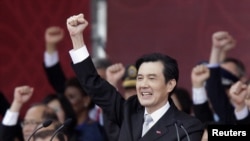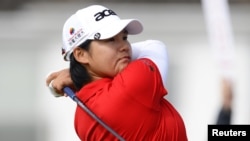TAIPEI —
China is edging economically closer to Taiwan, but that does not mean the island’s people are embracing the mainland. Taiwanese pride themselves on a separate cultural identity from China, despite their common ethnic roots.
Individuality
This month, a cultural fair in Hong Kong will promote Taiwan’s independent booksellers and filmmakers. But this is not a tourism event. Lee Ying-ping - director of the Kwang Hua Information and Culture Center under Taiwan’s government office in Hong Kong - says Taiwan needs the 40 cultural exhibits to make a lasting impression on territory already controlled by Beijing. She calls Taiwan’s culture a source of soft power.
Lee says Taiwan’s soft power, accumulated in the past few decades, has surpassed its politics and economy as an advantage worth using and a language for dialogue. She says many Hong Kong people find this aspect of Taiwan to be among its most interesting.
The effort in Hong Kong, a former British colony, is part of the Taiwan government’s four-year soft power plan. Knowing that China is bigger militarily and economically, Taiwan is looking for more global influence by showing off features, such as independent film and books - things that China cannot claim.
Analysts call this push part of a wider move to prove to the world and to itself, that Taiwan differs from China. Hsu Yung-ming, assistant political science professor at Soochow University in Taipei, points to an identity crisis that has generated debate in the local media and bridged party lines.
He sees a social sense of crisis, that is a worry that Taiwan will be sucked into a bigger political or economic entity and lose its separate identity - even be marginalized. Hsu says that no single government agency is pushing to solve the problem. He calls it a collective sense of crisis that bridges competing local political camps.
Rapprochement
Both major Taiwanese political parties agree Taiwan needs to form closer economic, trade and investment ties with China’s $7 trillion economy. Leaders in Beijing have signed 18 deals with Taipei since 2008, with more on the way. China is also pushing for talks that would lead toward closer political ties.
China has claimed sovereignty over Taiwan since the Chinese civil war of the 1940s. The two sides have been separately ruled since then. Taiwan’s two main parties support continuing to stand apart from China.
Opinion polls also indicate that more people are worrying about Taiwan’s relations with China. A National Chengchi University survey released this year found that 45 percent of Taiwanese think the pace of China-Taiwan exchanges is just right, compared to 33 percent who say it’s too fast.
“For military and diplomatic [ties], more people consider that cross-Strait relations have been very tense. The average is about 70 percent say it’s very tense on the diplomatic front," says Alexander Huang, a strategic studies professor at Tamkang University in Taipei.
International recognition
Taiwan has long supported an active international relations effort to combat China’s block on Taiwan’s bid to join the United Nations. This includes overseas humanitarian and development aid that goes far beyond helping Taiwan’s own allies.
Although these efforts are ongoing, many people in Taiwan are heartened more by events where their fellow citizens impress an international crowd. Athletes such as world's top-ranked female golfer, Yani Tseng, and National Basketball Association star Jeremy Lin, whose parents are Taiwanese, are revered.
For Huang Chia-fu, 21, a student at National Cheng Chi University in Taipei, it’s the informal recognition that counts.
He says it has gotten to a point where Taiwan finds it hard to promote itself in settings where China also participates. He says it may take other means to raise the island’s profile. He points to a local team’s top finish in a League of Legends PC game tournament in Los Angeles, earlier this month, as a show that Taiwan is a place that is not the same as China.
Beijing is still pushing for Taiwanese to embrace their Chinese roots, pointing to their common heritage as a reason to reunify politically. Two years ago, China asked Taiwan to sign an agreement that would direct the two sides to develop a joint culture and mingle their creative industries.
But Taiwan’s cultural minister said in August that the deal is off for now, leaving the island’s civil society to form links, on its own, with China.
Individuality
This month, a cultural fair in Hong Kong will promote Taiwan’s independent booksellers and filmmakers. But this is not a tourism event. Lee Ying-ping - director of the Kwang Hua Information and Culture Center under Taiwan’s government office in Hong Kong - says Taiwan needs the 40 cultural exhibits to make a lasting impression on territory already controlled by Beijing. She calls Taiwan’s culture a source of soft power.
Lee says Taiwan’s soft power, accumulated in the past few decades, has surpassed its politics and economy as an advantage worth using and a language for dialogue. She says many Hong Kong people find this aspect of Taiwan to be among its most interesting.
The effort in Hong Kong, a former British colony, is part of the Taiwan government’s four-year soft power plan. Knowing that China is bigger militarily and economically, Taiwan is looking for more global influence by showing off features, such as independent film and books - things that China cannot claim.
Analysts call this push part of a wider move to prove to the world and to itself, that Taiwan differs from China. Hsu Yung-ming, assistant political science professor at Soochow University in Taipei, points to an identity crisis that has generated debate in the local media and bridged party lines.
He sees a social sense of crisis, that is a worry that Taiwan will be sucked into a bigger political or economic entity and lose its separate identity - even be marginalized. Hsu says that no single government agency is pushing to solve the problem. He calls it a collective sense of crisis that bridges competing local political camps.
Rapprochement
Both major Taiwanese political parties agree Taiwan needs to form closer economic, trade and investment ties with China’s $7 trillion economy. Leaders in Beijing have signed 18 deals with Taipei since 2008, with more on the way. China is also pushing for talks that would lead toward closer political ties.
China has claimed sovereignty over Taiwan since the Chinese civil war of the 1940s. The two sides have been separately ruled since then. Taiwan’s two main parties support continuing to stand apart from China.
Opinion polls also indicate that more people are worrying about Taiwan’s relations with China. A National Chengchi University survey released this year found that 45 percent of Taiwanese think the pace of China-Taiwan exchanges is just right, compared to 33 percent who say it’s too fast.
“For military and diplomatic [ties], more people consider that cross-Strait relations have been very tense. The average is about 70 percent say it’s very tense on the diplomatic front," says Alexander Huang, a strategic studies professor at Tamkang University in Taipei.
International recognition
Taiwan has long supported an active international relations effort to combat China’s block on Taiwan’s bid to join the United Nations. This includes overseas humanitarian and development aid that goes far beyond helping Taiwan’s own allies.
Although these efforts are ongoing, many people in Taiwan are heartened more by events where their fellow citizens impress an international crowd. Athletes such as world's top-ranked female golfer, Yani Tseng, and National Basketball Association star Jeremy Lin, whose parents are Taiwanese, are revered.
For Huang Chia-fu, 21, a student at National Cheng Chi University in Taipei, it’s the informal recognition that counts.
He says it has gotten to a point where Taiwan finds it hard to promote itself in settings where China also participates. He says it may take other means to raise the island’s profile. He points to a local team’s top finish in a League of Legends PC game tournament in Los Angeles, earlier this month, as a show that Taiwan is a place that is not the same as China.
Beijing is still pushing for Taiwanese to embrace their Chinese roots, pointing to their common heritage as a reason to reunify politically. Two years ago, China asked Taiwan to sign an agreement that would direct the two sides to develop a joint culture and mingle their creative industries.
But Taiwan’s cultural minister said in August that the deal is off for now, leaving the island’s civil society to form links, on its own, with China.










